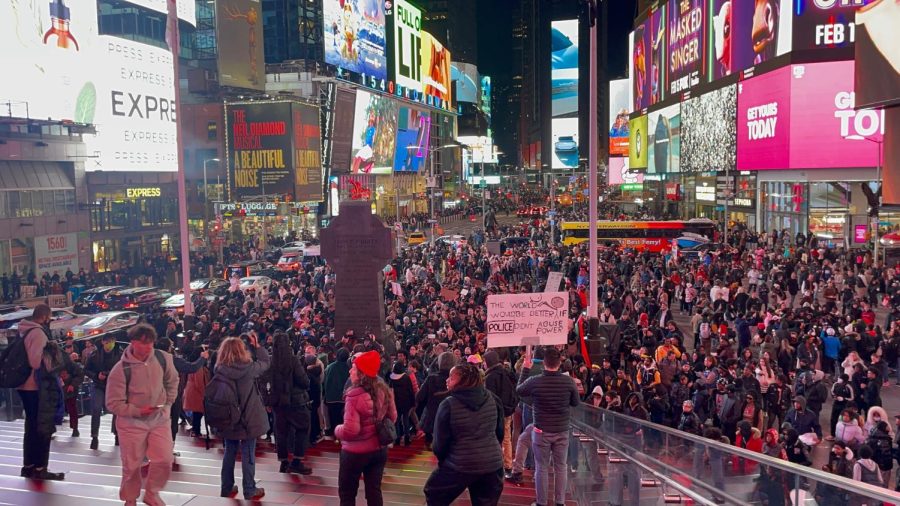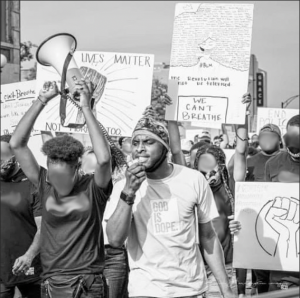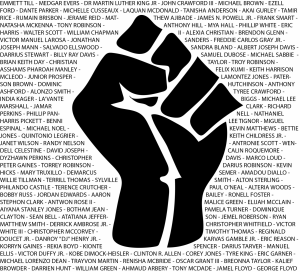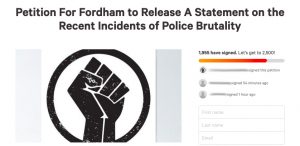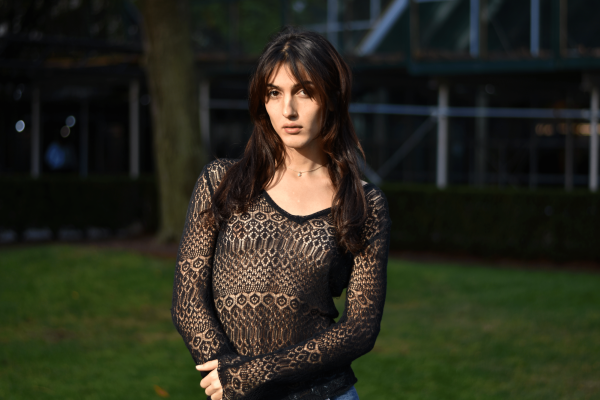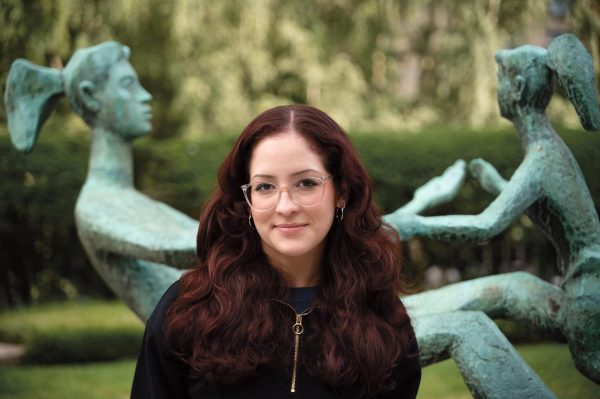‘We had to shout Tyre Nichols’ name’: New Yorkers and Fordham Community React to Latest Case of Police Brutality
Nichols’ death and the release of his videotaped violent encounter with the police sparked widespread conversations among Fordham students, professors and members of the administration
Protestors marched from Washington Square Park to Times Square at a Jan. 28 gathering in response to the death of Tyre Nichols.
February 10, 2023
Several protests were organized in New York and other cities across the United States following the death of Tyre Nichols, a 29-year-old Black man who was beaten by police officers in Memphis, Tennessee, on Jan. 7. Nichols, who died three days later, was the father of a 4-year-old boy and a recreational skateboarder, painter and overnight shift employee at FedEx. He was pulled over on his way home from work, according to his family’s lawyers.
Nichols was stopped on the suspicion of reckless driving, which then violently escalated. Following the encounter, Nichols was in critical condition, and, on Jan. 10, the Tennessee Bureau of Investigation announced that he had “succumbed to his injuries.”
Fordham students and New Yorkers took to the streets to remember “Tyre Nichols” and advocate in his name. Demonstrators gathered in Washington Square Park, Times Square and other New York locations to protest the police brutality used against Nichols.
Twenty days after Nichols’ encounter with the police on Jan. 27, the Memphis Police Department released the video showing the attack. Nine days before that, a federal investigation was opened up by the Department of Justice and the FBI, and the five police officers that were involved in the incident, who are Black, were fired on Jan. 20.
A sixth police officer, who is white and had fired his taser at Nichols, was fired on Feb. 3. On Feb. 8, City of Memphis Chief Legal Officer Jennifer Sink said seven additional Memphis police officers are facing potential administrative discipline. This includes a police officer who was suspended on Jan. 30 by the Memphis Police Department, but details of his identity and his involvement have not been made public.
The five former Memphis police officers who were initially fired were charged with second-degree murder and other crimes that include kidnapping, official misconduct and official oppression. The sixth and seventh former police officers have not been charged with any criminal offenses.
The five former Memphis police officers who were initially fired were charged with second-degree murder and other crimes that include kidnapping, official misconduct and official oppression. The sixth and seventh former police officers have not been charged with any criminal offenses. In addition, the Memphis Fire Department fired two EMTs and a lieutenant for not providing care for 19 minutes after their arrival to the scene.
According to The New York Times, the Memphis district attorney stated that “The actions of all of them (the five police officers initially charged) resulted in the death of Tyre Nichols, and they are all responsible.”
U.S. President Joe Biden released his statement via Twitter on Jan. 27 in response to Nichols’ encounter with the police. He expressed his support of the Nichols family and called for peaceful protest.
“Like so many, I was outraged and deeply pained to see the horrific video of the beating that resulted in Tyre Nichols’ death,” he said. “It is yet another painful reminder of the profound fear and trauma, the pain, and the exhaustion that Black and Brown Americans experience every single day.”
Biden later invited Nichols’ mother and stepfather, RowVaughn and Rodney Wells, to attend his State of the Union address on Feb. 7. New York Gov. Kathy Hochul and New York City Mayor Eric Adams also responded to the attack in a press conference on Jan. 27, calling for peaceful protests.
Fordham Community Reflects on Protests Following to Nichols’ Death
The release of the footage showing the violent encounter sparked conversations across the Fordham community in regard to policing and the power of protesting.
Tristan Grant, Fordham College at Lincoln Center (FCLC) ’25, attended a protest in Washington Square Park on Jan. 28 and emphasized the obligation they felt to chant Nichols’ name.
“We had to walk all the way here, we had to get on these steps, and we had to shout Tyre Nichols’ name,” Grant said.
“I don’t think that there has been real substantial change since Rodney King, because the rate at which this is happening have not slowed down.” Ivelisse Cuevas-Molina, an assistant professor in the political science department at Fordham
Another attendee from the same protest, Christian Ripke, FCLC ’25, shared a phrase that he recalled from the demonstration: “The poisonous tree of policing has to be uprooted and needs to be replanted.”
Ivelisse Cuevas-Molina, an assistant professor in the political science department at Fordham, compared Nichols’ attack to that of Rodney King by Los Angeles police officers. Nichols’ death comes nearly 32 years after King’s beating, where police kicked, tased and attacked King with a baton repeatedly during an arrest.
In King’s case, the acquittal of four officers triggered six days of rioting in Los Angeles and disturbances across the U.S. Cuevas-Molina said that she believes there has been little significant change in a reduction of police force between the beatings of Nichols and King.
“With the case of Rodney King, people were out in the streets protesting against what happened to him in California, and the truth is that this just continues to happen,” she said. “I don’t think that there has been real substantial change since Rodney King, because the rate at which this is happening have not slowed down.”
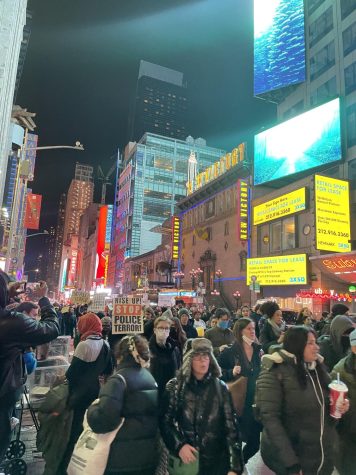
Cuevas-Molina also noted that protests are “a legitimate form of political participation” and added that they are a right protected by the First Amendment.
“It is clear that throughout our history in the United States, protests have been an effective way to get political and social change,” she said.
The Nuanced Racial Politics of Nichols’ Murder
Since George Floyd’s death at the hands of Minneapolis police in 2020, laws implementing police reform have been passed throughout the United States. In spite of this legislation, killings by police reached an all-time high in 2022. According to The Guardian, Black Americans compose 13% of the population but make up 24% of those killed by police violence.
When the mugshots of the police officers involved were released, Grant noted feelings of disheartenment.
“The notion that Black men could so hastily gang up, brutalize, and execute another Black man in this way was frankly sickening,” he said. “For these officers, basic human rights were of no consideration, so any togetherness or kinship (sometimes displayed between people of the same community) would also be voided or severed.”
“The race of the police officers is largely inconsequential because every day cops choose to carry the badge, they carry out and uphold a legacy of stolen lives and deadly force that terrorize minority communities all over the nation.” Tristan Grant, FCLC ’25
Since at least five of the seven officers who maltreated Nichols were Black, Grant emphasized that the race of the police officers is ineffective at preventing extreme force because of the legacy of policing and role of police in underserved communities, which are disproportionately Black and Latine.
Reactions across social media have emphasized that the race of the majority of the police officers involved was unsurprising, since patterns of tracking police violence have revealed that the issue of police brutality is not one of individual bias but a larger systemic issue that encompasses a myriad of legal and social institutions.
“The race of the police officers is largely inconsequential because every day cops choose to carry the badge, they carry out and uphold a legacy of stolen lives and deadly force that terrorize minority communities all over the nation,” Grant said. “And it is this dogma that permeates into their work; race, skin color, and, it seems, even human decency are swept aside the moment the badge is donned.”
“To see them have such a lack of empathy toward Tyre Nichols shows to me that it’s a much deeper issue with our policing system than just race.” John Perla, FCLC ’25
John Perla, FCLC ’25, stated that there is “no doubt in his mind” that each of the five police officers initially charged had been victims of discrimination at some point.
“To see them have such a lack of empathy toward Tyre Nichols shows to me that it’s a much deeper issue with our policing system than just race,” he said.
Police Brutality in the Digital Age
As technology has developed, video documentation as evidence has become more significant in police brutality cases. According to the New York Police Department (NYPD) webpage, NYPD officers are equipped with body cameras. Research has shown that the existence of body cams does not prevent excessive force.
One of the first videotaped instances of police brutality was during the 1960s Civil Rights Movement on Bloody Sunday in Selma, Alabama. Protestors were attacked by police while they walked, unarmed, across the Edmund Pettus Bridge demanding the right to vote, something that was largely denied to the Black community at the time.
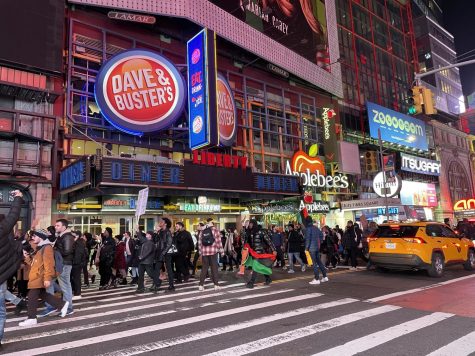
News outlets documented this attack, and the video was widely distributed.
Cuevas-Molina credited the passage of the 1964 Voting Rights Act, which happened nearly six months later, directly to the protest and, more specifically, to the graphic photographs of the protests that were made public.
“Without the press having documented what happened at Edmund Pettus Bridge, we might not have a Voting Rights Act,” she said.
Including Bloody Sunday, video evidence has been used in countless cases of police brutality, including the killings of King, Floyd in 2020 and now Nichols.
The widespread distribution of these violent images involving Black people can have negative mental repercussions for viewers.
Cuevas-Molina cited the “terrible psychological effects” Black people can face after seeing these videos repeatedly. She also mentioned the possible desensitization for the public after repeatedly watching these acts of violence. Despite these misgivings, she said that recorded evidence is important for enacting change.
Jeffrey Gray, senior vice president for student affairs, sent a statement to members of the university community on Jan. 27 in response to the murder of Nichols. He noted that there is a collective focus on the events unfolding in Memphis and the video documenting the beating.
“The truth is that mass media has been central to the advancement of civil rights,” she said.
Rabbi Barat Ellman, professor of theology at Fordham Lincoln Center, and Perla noted that the video of Nichols was incredibly hard to watch and that they had to stop the recording multiple times.
Ellman noted that the videos have been important in highlighting disparities in policing across different communities, especially for individuals who do not live in overpoliced neighborhoods.
“It’s also been important from the standpoint of prosecution of policing, but there’s a lot of work to do in that direction,” she said.
Members of the Fordham Administration Share Their Thoughts
Jeffrey Gray, senior vice president for student affairs, sent a statement to members of the university community on Jan. 27 in response to the murder of Nichols. He noted that there is a collective focus on the events unfolding in Memphis and the video documenting the beating.
“As a university, we work hard to find the answers to the world’s terrible problems and to gain the tools we need to go out and make a difference,” Gray said.
He also noted that he recognizes the difficulty that comes with watching videos of police brutality and shared university resources at the bottom of the email, including Counseling and Psychological Services as well as Campus Ministry.
Gianna McGrath, Gabelli School of Business at Lincoln Center ’25, praised the university for issuing an official statement and providing resources to students who may need support. She also mentioned how Fordham is consistent with releasing some form of correspondence during moments of political or social unrest.
“It shows that they’re aware of everything happening in the world,” she said. “Fordham is usually good about issuing statements whenever something like this happens, in terms of an attack against certain communities.”
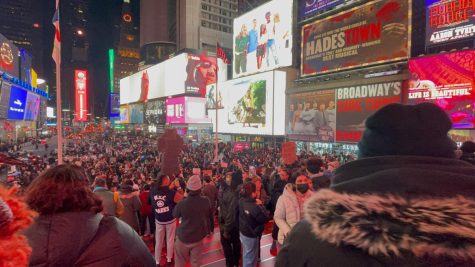
Despite the university’s issuance of a statement, McGrath noted that she wished the school would have done more in recognizing police brutality as an act of aggression and racism and offering support specifically for students of color.
A few days later, FCLC Dean Laura Auricchio included her own reaction in her newsletter on Feb. 1.
“On this first day of Black History Month I write with mixed emotions — jubilation for triumphs, solemnity and gratitude for past and present struggles and sacrifices, and searing grief in the wake of the beating death of Tyre Nichols,” she said.
Auricchio also referenced a statement from University President Tania Tetlow, J.D., that had been posted via Twitter on Jan. 27. The president expressed her reaction to the news and the video.
“Like you, I have seen the video of the Memphis police officers charged with murdering Tyre Nichols, and like you, I am watching the protests in Memphis and elsewhere with anxious prayers — for change, for justice, for basic human dignity.”University President Tania Tetlow, J.D.
“Like you, I have seen the video of the Memphis police officers charged with murdering Tyre Nichols, and like you, I am watching the protests in Memphis and elsewhere with anxious prayers — for change, for justice, for basic human dignity,” Tetlow said.
Members of the Memphis community gathered to attend Nichols’ funeral on Feb. 1. Close relatives of other victims of police brutality were also in attendance. Philonise Floyd, George Floyd’s brother; Tamika Palmer, the mother of Breonna Taylor, who was fatally shot in Louisville; and the mother of Eric Garner, who died in a choke hold on Staten Island, were among those who were present. The arraignment date for the officers charged with second-degree murder is set for Feb. 17.
Alexa Villatoro contributed additional reporting to this story.

